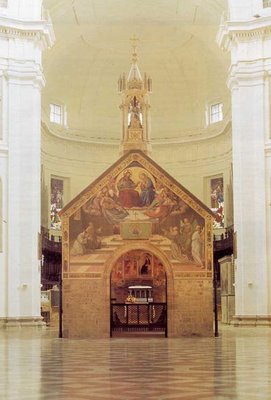Memorial (1969 Calendar): July 31
Greater Double (1955 Calendar): July 31
St. Ignatius of Loyola was born a Spaniard of a noble family at Loyola in 1491; he was the youngest of twelve children. He eventually joined the military in 1517 and served as a Captain until May 20, 1521, when a cannonball fractured his left leg and nearly crippled him. Following this near-death experience, St. Ignatius of Loyola began to learn to read. And he began to read pious books, which enkindled a fire in his heart to love and serve Jesus Christ. The only books available to him during his recovery were
The Golden Legend
, a collection of lives of the saints, and the Life of Christ by Ludolph the Carthusian. In turn, he began to focus his life on Christ.
St. Ignatius of Loyola traveled to Montserrat, where he hung up his arms before an altar of the Blessed Virgin Mary under the title of the Virgin of Montserrat and prayed the entire night. He was transformed from a man of war into a soldier for the Kingdom of God. And, St. Ignatius served Christ for many, many years and saved thousands of souls.
He then left for Manresa and gave his noble garments to a beggar. In sackcloth, he stayed in Manresa in a cave and lived off of bread and water given to him as alms. He had turned away everything of the world and humbled himself to grow in holiness. St. Ignatius fasted every day except Sundays. He also slept on the ground and himself with iron disciplines. He was a man of penance, who, during his time in Manresa, received revelations by the Lord. There, he wrote his
Spiritual Exercises
, even though he was a man without formal education.
St. Ignatius again humbled himself and realized that he needed a formal education in order to save more souls. St. Ignatius began to study grammar with children. In 1523, he journeyed to the Holy Land to convert Muslims. And, through it all, his zeal to save souls never abated. He lived for the salvation of souls. St. Ignatius accept sufferings, beatings, imprisonment, and numerous other trials in order to save souls.
In 1528 he began studying theology in Barcelona and Paris. On March 14, 1534, he received his degree in Theology. St. Ignatius was joined by nine men, who had taken their degrees in Arts and Theology. This was the foundation of the Society of Jesus (Jesuits), which St. Ignatius would establish soon after in Rome. On August 15, 1534, he formed the
Constitutions of the Society of Jesus. He added along to the traditional vows of poverty, chastity, and obedience, a vow for missions. The Society of Jesus was approved by Pope Paul III in 1541 and again approved by following pontiffs and councils.
St. Ignatius soon sent St. Francis Xavier to Indies to proclaim the Gospel. He sent people all around the entire world to preach the Truth and in so doing declared a new war - a war against paganism, superstition, and heresy. He never used the term "Jesuit" surprisingly. The term originated as an insult by his opponents, but today it is used with pride by the Society of Jesus.
Throughout history, God has raised up saints and prophets in times of need. In those times when heretics rose up, God raised up defenders of the truth. And God rose up St. Ignatius of Loyola to preach the truth in an era that was tainted by the lies of Martin Luther and other heretics.
St. Ignatius focused on piety. He wanted to spread piety throughout the entire earth. So, St. Ignatius worked to open schools for piety, increase the beauty of the sacred buildings, and increase the frequency of sermons and of the Sacraments. In Rome, St. Ignatius founded the German College, orphanages, and refuges for women of evil life and for young girls. St. Philip Neri and others saw St. Ignatius's countenance shining with heavenly light.
Finally, after 65 years on earth, St. Ignatius of Loyola died on July 31, 1556. In less than 50 years, he along with his companion St. Francis Xavier, would be canonized. Today the Society of Jesus has over 500 universities and colleges, 30,000 members, and teaches over 200,000 students each year.
Source:
The Liturgical Year, Abbot Gueranger O.S.B
.
Prayer:
O God, Who to spread the greater glory of Thy name, didst by means of blessed Ignatius, strengthen the Church militant with a new army: grant that with his help and through his example we may so fight on earth as to become worthy to be crowned with him in heaven. Through our Lord.
Prayer Source: 1962 Roman Catholic Daily Missal














